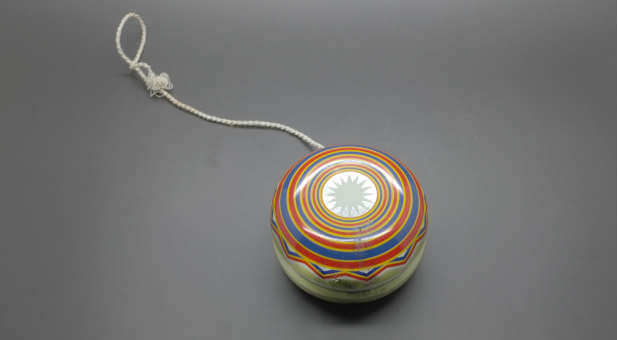This year, after we prepared our Passover Seder table, I took a photo of the table and posted it on social media because I thought the table looked beautiful. It wasn’t until I started receiving comments on my post that I realized that there was an additional item that had been placed on the table.
My grandson had placed his yo-yo on the table and while I didn’t see it when I took the photo, it was clearly visible to those who saw the picture on my wall. When the first person posted a comment about liking the addition of the yo-yo to the table, instead of removing and replacing the photo, I commented back. “The yo-yo is symbolic of the ups and downs of the Israelites in the wilderness.” That comment was responded to by many people. This may now have to become a new tradition we add to our household Seder.
For those who may not celebrate Passover, every year we gather around our tables with our families, and through the traditions of the Passover Seder (what you might know as the Last Supper), we retell the story of the Exodus from Egypt and share how those same events were mirrored in the life, death and Resurrection of Yeshua. As we have the Seder meal, we eat matzah, drink wine, eat charoset (a mixture of apples, honey, raisins, dates, nuts and wine), eat horseradish and eat parsley dipped in salt water. As we eat each of these traditional foods, we use them to share the story.
While many people are familiar with the Seder meal and the role these different items play in telling the story, many don’t know that only the lamb (which we don’t sacrifice anymore), the matzah and the bitter herbs are actually mentioned in the Bible. The wine, charoset, parsley and salt water, as well as the afikoman, are all traditions added to the Seder, many which were in place during the time of Yeshua.
In other words, Yeshua didn’t simply follow the written commandments; He also followed Jewish traditions which were in place during His life. That is right. Yeshua did not reject the traditions of Judaism. Yes, He did reject some of the traditions of Judaism, those which directly contradicted the Torah.
But the truth is He went out of His way at great lengths to keep Jewish tradition. We see this shown strongly within the Gospels, as they share about Yeshua’s final Seder with His disciples.
Just think about this in the context of what is going on. Yeshua knows this is the last hours before His execution, yet He chooses to have the Seder meal with His disciples. He could have had an abbreviated meal using only those items actually required by the Torah. However, He chose to not only eat matzah and bitter herbs, but He also drank wine and ate charoset.
Not only did He eat these traditional foods, He also said blessings before consuming the wine and the bread. Saying these blessings before eating and drinking are also traditions.
But Yeshua even goes further than that. Notice what we read in Matthew 26:30: “After singing the Hallel, they went out to the Mount of Olives.”
After Yeshua finished eating the meal at His Seder, He continued to follow Jewish tradition and sing the Hallel Psalms (Ps. 113-118) before He and the disciples left to go to the Mount of Olives. Just think about this: Yeshua believed following traditions was so important that while knowing He was about to be betrayed by Judas and die the ghastly death of crucifixion, He still took the time to sing these beautiful praise songs.
Why did He do this? I know some will say He sang to show His complete commitment and faith in the plan of redemption, and I think that is a part of it. However, I believe that Yeshua was demonstrating to His followers, including those of us who follow Him today, the importance of keeping the traditions that were passed down to us.

This is why we read what Paul wrote in 2 Thessalonians 2:14-15:
“He called you to this salvation through our proclaiming the Good News, for you to gain the glory of our Lord Yeshua the Messiah. So then, brothers and sisters, stand firm and hold on to the traditions which you were taught, whether by word of mouth or by our letter.”
Bring Charisma magazine home with a subscription today!
Eric Tokajer is the author of “Overcoming Fearlessness,” “What If Everything You Were Taught About the Ten Commandments Was Wrong?,” “With Me in Paradise,” “Transient Singularity,” “OY! How Did I Get Here?: Thirty-One Things I Wish Someone Had Told Me Before Entering Ministry,” “#ManWisdom: With Eric Tokajer,” “Jesus Is to Christianity as Pasta Is to Italians” and “Galatians in Context.”














































